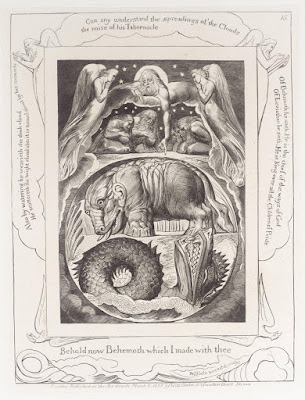 |
| Image credit. The image depicts Behemoth and Leviathan, symbolic creatures that represent in the philosophy of Thomas Hobbes the monster of chaos (Behemoth) and the monster of order ( = the state = Leviathan). |
Continued from Notes on 'Understanding Government Finance" (1) - What Is Money?
We have seen that money is a record of debt. Now, what kind of money would it be advisable to choose? As Hyman Minsky used to say: everyone can create money. The difficulty is to get it accepted.
Privately Issued Money
I could walk up to my baker and offer him an IOU (an "I owe you," a "Schuldtitel," a confirmation of an obligation to pay) on a piece of paper on which my hand-written promise affirms that as of next week I will transfer to anyone who produces this paper to me a nugget of gold.
I could walk up to my baker and offer him an IOU (an "I owe you," a "Schuldtitel," a confirmation of an obligation to pay) on a piece of paper on which my hand-written promise affirms that as of next week I will transfer to anyone who produces this paper to me a nugget of gold.
The baker is likely to ask me to forget about the offer and better pay him € 1,70 for the cup of tea I have just been handed. In other words, he is rejecting private money issued by me as a private person in favour of money issued by government. Why?
Publicly Issued Money
Publicly Issued Money
Ultimately, the reason why has to do with the monopoly of coercion held by the state.
By demanding and enforcing taxes, the government lends inescapable significance to the money it chooses to issue. It thereby turns its money into a desired good.
If a person does not pay the taxes the government imposes on her, she can expect to be dealt with harshly by the authorities (getting thrown into prison etc.). So she better pay taxes.
How do you pay taxes? You return money
In a sense, government money is like a tax credit. Every dollar denominated in the government's currency is a dollar entitling you to redeem your tax debt by the same amount. Put differently, every dollar that you hand over to the government means you owe it one dollar less, your tax obligation is being reduced by one dollar.
So, to avoid being dealt with harshly by the monopolist of coercion (the government), you must pay your taxes. And the only way to do this is to earn money denominated in the currency issued by the government.
The need to pay taxes is a "nuisance" we all have to suffer. And hence, we all tend to favour money denominated in the government's currency.
At the same time, the implacable requirement of having to pay taxes to the government, gives value to the currency that the government issues. It may issue materially worthless tokens, yet these tokens will have considerable value for reasons other than being worth in themselves. They are valuable because they spare you being executed or being thrown into prison by the government.
This view of
As we shall see later, the creation of money is not confined to the government. Private agents may be licensed to create money. Since only the state can confer such a license, the latter will restrict the creation of money to money denominated in government currency.
To be continued in Notes on "Understanding Government Finance" (3).
By demanding and enforcing taxes, the government lends inescapable significance to the money it chooses to issue. It thereby turns its money into a desired good.
If a person does not pay the taxes the government imposes on her, she can expect to be dealt with harshly by the authorities (getting thrown into prison etc.). So she better pay taxes.
How do you pay taxes? You return money
- issued by the government, i.e. money denominated in the government's currency
In a sense, government money is like a tax credit. Every dollar denominated in the government's currency is a dollar entitling you to redeem your tax debt by the same amount. Put differently, every dollar that you hand over to the government means you owe it one dollar less, your tax obligation is being reduced by one dollar.
So, to avoid being dealt with harshly by the monopolist of coercion (the government), you must pay your taxes. And the only way to do this is to earn money denominated in the currency issued by the government.
The need to pay taxes is a "nuisance" we all have to suffer. And hence, we all tend to favour money denominated in the government's currency.
At the same time, the implacable requirement of having to pay taxes to the government, gives value to the currency that the government issues. It may issue materially worthless tokens, yet these tokens will have considerable value for reasons other than being worth in themselves. They are valuable because they spare you being executed or being thrown into prison by the government.
This view of
- money as being valuable owing to state coercion
As we shall see later, the creation of money is not confined to the government. Private agents may be licensed to create money. Since only the state can confer such a license, the latter will restrict the creation of money to money denominated in government currency.
To be continued in Notes on "Understanding Government Finance" (3).
No comments:
Post a Comment